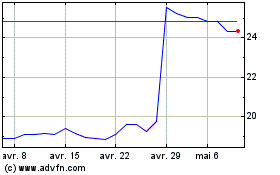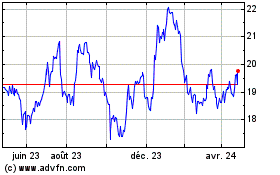Philips highlights latest advances in stroke care at the 2022 World Stroke Congress
25 Octobre 2022 - 10:00AM

Philips highlights latest advances in stroke care at the 2022 World
Stroke Congress
October 25, 2022
- Philips showcases innovations in its end-to-end stroke care
pathway solutions aimed at improving treatment and quality of life
for stroke patients
- Symposium hosted by Philips features leading clinical experts
discussing early detection of stroke, new guidelines for
reperfusion therapy, and the health economic impact of a novel
stroke pathway: direct-to-angio-suite
Amsterdam, the Netherlands – Royal Philips
(NYSE: PHG, AEX: PHIA), a global leader in health technology, today
announced it will showcase the company’s latest advances to support
the treatment of stroke patients at the 14th Annual World Stroke
Congress (WSC 2022, October 26-29, Singapore). Philips’ end-to-end
stroke care solutions help advance stroke care through early
detection and an optimized workflow that reduces the time to
treatment – a key factor in delivering the best stroke patient
outcomes. To connect information, technologies, and people across
the stroke care pathway, enabling care teams to work quickly and
act decisively, Philips works closely with stroke care partners
such as MedTech stroke care company Nicolab, who will join Philips
at the 2022 World Stroke Congress.
Globally, one in four adults over the age of 25 will suffer a
stroke in their lifetime [1], making it the leading cause of
disability and the second leading cause of death worldwide [2]. The
key to improving outcomes for stroke patients is to provide
treatment as quickly as possible. Physicians in an emergency stroke
setting are fighting the clock and under intense pressure to make
optimal treatment decisions. Despite the imperative for speed, care
teams currently lose valuable time due to gaps in communication,
information, and access to stroke expertise.
"This World Stroke Day we are committed to improving stroke
care,” said Angelique Balguid, Head of Marketing for Neurovascular
Portfolio at Philips. “At each vital step, from early detection to
treatment and recovery, we are collaborating with caregivers to
speed up the stroke care pathway, because every minute matters for
stroke patients. We aim to push the boundaries and set new
standards, so that clinicians can act faster, improve outcomes, and
grow access to care.”
Challenging the status quo of stroke careOn
Wednesday, October 26, from 12:00 to 13:00 in Hall Summit 2 at this
year’s World Stroke Congress, Philips will host a satellite
symposium with talks from leading clinical stroke care experts,
featuring Drs. Rotem Sivan-Hoffman, Head of the Radiology
Department at Meir Medical Center (Haifa, Israel) and founder and
Chief Medical Officer at CVAid, Prof. dr. Wim H. Van Zwam, PhD,
Interventional Radiologist at Maastricht University Medical Center
(Maastricht, The Netherlands), and Dr. Marc Ribó, PhD,
interventional neurologist at University Hospital Vall d'Hebron,
(Barcelona,Spain). The discussion will be moderated by Philips’
Angelique Balguid and explore a range of topics, including the
early detection of stroke, new guidelines for reperfusion therapy,
and the health-economic impact of a novel stroke pathway: the
direct-to-angio-suite approach.
To learn more about Philips’ in-booth demonstrations, immersive
experiences, and the full schedule of events click here.
Solutions across the stroke care pathwayPhilips’
comprehensive stroke suite includes solutions for stroke monitoring
and communication in ambulances, tele-stroke patient assessment,
diagnostic imaging and analysis, image-guided therapy, neurological
monitoring and assessment, and more. These solutions are aimed at
improving diagnostic confidence and time to treatment, and helping
reduce the risk of a second stroke.
- Philips Neuro suite is based on the company’s Image Guided
Therapy System – Azurion. This suite is delivering the latest
advances in interventional neuroradiology, such as the company’s
industry-leading CT-like SmartCT 3D visualization and
measurement tool, to assist interventional neuroradiologists with
diagnosis and treatment. .
- Philips’ solutions leverage the advanced CT capabilities of the
company’s Spectral CT 7500 spectral CT scanner to improve
diagnostic capabilities for radiologists. The Spectral CT 7500
offers enhanced gray and white matter differentiation [3] and
improved image quality for the detection of subtle hemorrhage [4]
and may help in the detection of ischemic stroke through enhanced
visualization of vascular anatomy.
- Philips is also integrating cloud-based, end-to-end, artificial
intelligence-based [5] stroke triage, communication, and management
solutions through StrokeViewer, via its partnership with
Nicolab, aiming to improve patient outcomes by connecting care
teams to optimize the overall stroke workflow.
- Supporting post-stroke remote telemetry, Philips Holter –
ePatch – replaces the cumbersome setup of conventional Holter
monitors with a small unobtrusive body sensor and patch adhered to
the patient’s sternum for up to 14 days of continuous, high-quality
electrocardiogram (ECG) recording for reliable diagnosis [6] of
patients with atrial fibrillation (AF). Philips also provides an
end-to-end service to support practices in the deployment of
ePatch, enabling efficient workflows, enhancing the patient
experience, and providing robust data analysis using cloud-based
AI-enabled Philips Cardiologs software.
The future of stroke care To learn more about
Philips’ stroke care solutions and stroke management click here. A
media backgrounder on how Philips is enabling the future of stroke
care by connecting and integrating the patient journey can be found
here.
Social responsibilityEarlier this week, the
Philips Foundation announced it is exploring the
possibilities of deploying Philips' expertise in stroke care in
underserved settings, as well as supporting several projects
designed to identify best practices and scalable initiatives to
create a bedrock for better stroke care, such as the support of the
development of a new online platform called Collavidence to
increase stroke research funding.
[1] World Stroke Organization [2] Global Burden of
Stroke, PubMed. [3] Neuhaus V, et al. Improvement of image quality
in unenhanced dual-layer CT of the head using virtual monoenergetic
images compared with polyenergetic single-energy CT. Invest Radiol.
2017;52(8):1. DOI: 10.1097/RLI.0000000000000367. [4] Gulko E, et
al. Differentiation of hemorrhage from contrast enhancement using
dual-layer spectral CT in patients transferred for acute stroke.
Clin Imaging. 2021;69:75–78. DOI: 10.1016/j.clinimag.2020.06.046.
[5] We embrace the following formal definition of AI
(source: HLEG definition AI) [6] Patient will need to replace
patch on day 5 of wear, or sooner as required
For further information, please contact:
Joost MalthaPhilips Global Press OfficeTel.: +31 6 10 55
8116E-mail: joost.maltha@philips.com
About Royal Philips
Royal Philips (NYSE: PHG, AEX: PHIA) is a leading health
technology company focused on improving people's health and
well-being and enabling better outcomes across the health continuum
– from healthy living and prevention, to diagnosis, treatment, and
home care. Philips leverages advanced technology and deep clinical
and consumer insights to deliver integrated solutions.
Headquartered in the Netherlands, the company is a leader in
diagnostic imaging, image-guided therapy, patient monitoring and
health informatics, as well as in consumer health and home care.
Philips generated 2021 sales of EUR 17.2 billion and employs
approximately 79,000 employees with sales and services in more than
100 countries. News about Philips can be found
at www.philips.com/newscenter.
- Philips Azurion with Neuro suite
- Philips Spectral CT7500 MR scanner
- Philips ePatch high-quality ECG recording
Koninklijke Philips NV (EU:PHIA)
Graphique Historique de l'Action
De Avr 2024 à Mai 2024

Koninklijke Philips NV (EU:PHIA)
Graphique Historique de l'Action
De Mai 2023 à Mai 2024
